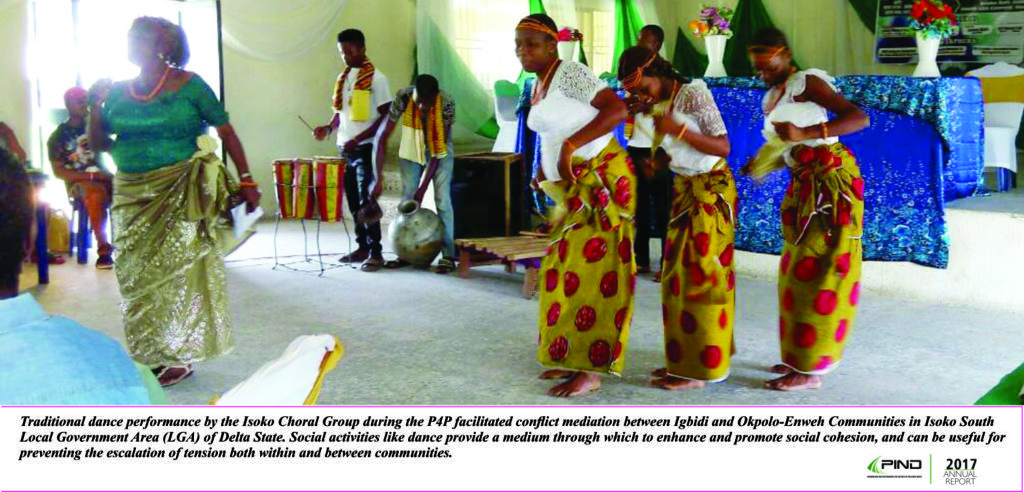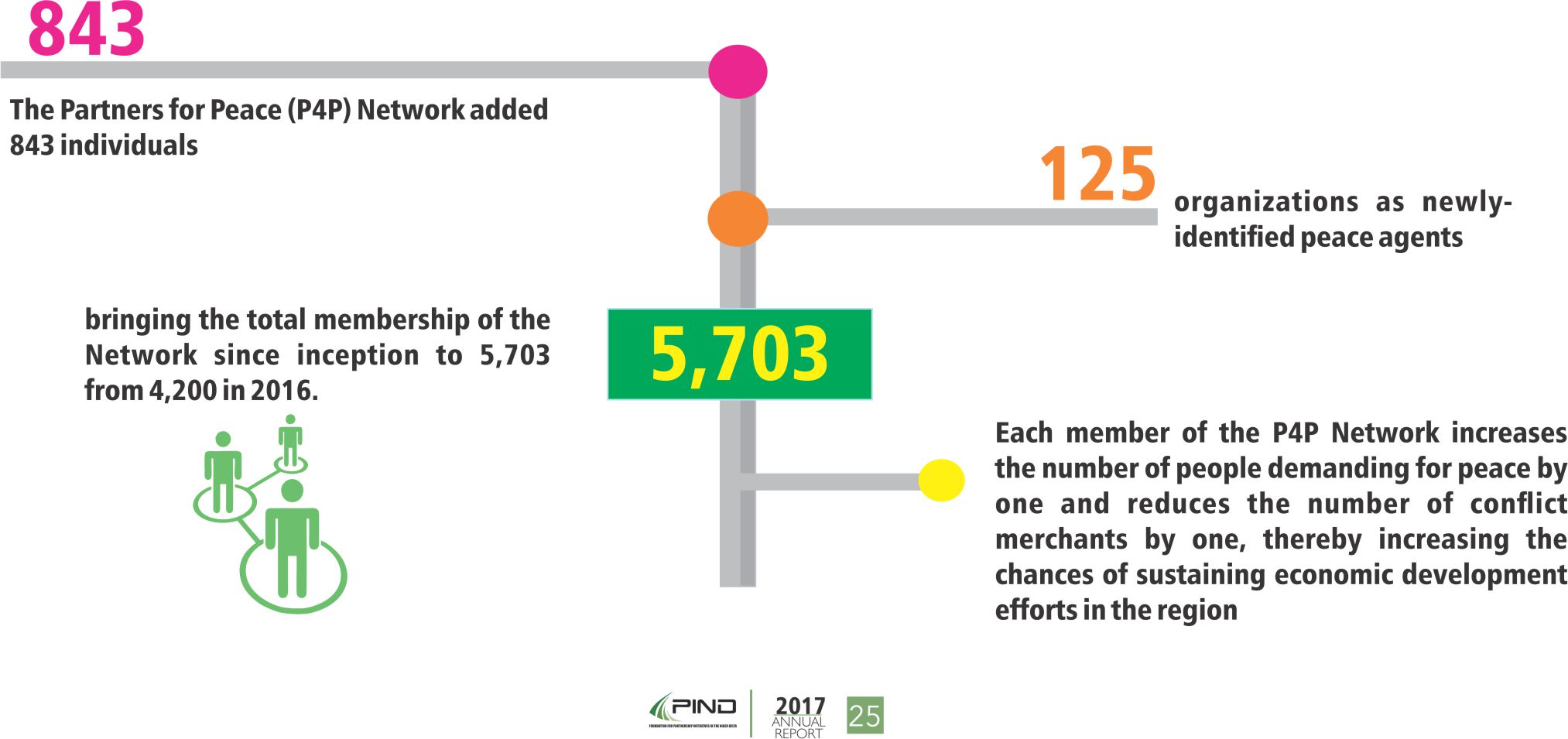We strengthen conflict resolution mechanisms to enable integrated peace and economic growth.
Fostering Stability through a Regional Peace Infrastructure of Champions, Structures and Processes.
For decades, the Niger Delta has experienced significant conflict across the region that have had severe effects on livelihoods. Driving these conflicts are myriad issues that have impacted negatively on economic growth and development and have succeeded in keeping many parts of the region in a cycle of instability and violence.
As building peace goes beyond ending conflict, during the year, our peacebuilding program continued facilitating a network of interdependent indigenous structures, mechanisms, resources, values and skills which foster conflict prevention and sustain lasting peace for economic growth. Dialogue, collaboration and consultation were key in achieving these.

Partners for Peace (P4P) Network Mitigated Conflicts: To promote synergy and cooperation among peace actors in the region, PIND had established the Partners for Peace (P4P) project in 2013 as a unique approach to peace-building designed to build social capital around peace- in the Niger Delta by amplifying the voices of positive peace actors, and building a network of self-identified agents of peace.
The resultant Partners for Peace (P4P) Network made up of peace actors with coverage in all nine States of the Niger Delta, is built on proactive collective action, volunteerism and team spirit. The Network began building the capacity of the members on conflict analysis and conflict early-warning, as well as mediation and negotiation tools needed to identify the root causes of conflict and execute targeted interventions. The Network has advanced to identifying initiatives that address salient conflict risk factors and facilitated interventions targeted at peace building in their communities to create an enabling environment for economic development.
Building on work from previous years, in 2017, we trained 146 persons (77 males, 42 females) from across the nine P4P State chapters on the use of data for conflict analysis and planning through conflict assessment workshops. This increased the skills and confidence of the P4P members to address emerging conflict issues which earned them the trust of communities who now request for their help in resolving disputes and are experiencing peace and stability as a result of the Network’s efforts.

The Partners for Peace (P4P) Network added 843 individuals and 125 organizations as newly-identified peace agents, bringing the total membership of the Network since inception to 5,703 from 4,200 in 2016. Each member of the P4P Network increases the number of people demanding for peace by one and reduces the number of conflict merchants by one, thereby increasing the chances of sustaining economic development efforts in the region.
During the year, P4P established 5 new sub-chapters in Koluama in Southern Ijaw Local Government Area (LGA) of Bayelsa State, Patani in Patani LGA, Oleh in Isoko South LGA; Ellu in Isoko North LGA of Delta State; and Igbokodain Ilaje LGA of Ondo State, resulting in more peacebuilding activities being carried out in riverine communities. Additionally, the Network reached over 5 million people with peace messaging on the dynamics of conflict and the importance of peace through media engagements.
Part of our sustainability strategy for the P4P network is to imbue each state chapter with the ability to source and utilize its own resources to fund peacebuilding activities independent of PIND. To achieve this, our peacebuilding team facilitated resource mobilization workshops for 120 (68 males, 52 females) peace advocates from across the eight chapters of the P4P Network and another 23 members (12 males, 11 females) from the Delta State chapter to develop their fund raising capabilities.
To further assure of the sustainability of their grassroots peacebuilding initiatives, our team facilitated the expansion of the Board of Trustees (BOT) and make it more functional to provide fiduciary and strategic oversight for the P4P Network. The first BOT meeting held in October 2017, thus making all the organs of the P4P (as established in its charter) now fully functional.
Also in the year, PIND completely devolved the responsibility of funds administration to the Network’s Central Working Committee (CWC) that facilitates, coordinates and shapes the strategic direction of the Network. , while maintaining oversight for this function.
In addition, the Foundation handed the provision of administrative support for the quarterly CWC meetings and other tasks like providing support for program design, planning, implementation, reporting and budgeting oversight to the P4P Secretariat supervised by the CWC and operated by the State Liaison Officers (SLOs) and Data and Documentation Officer.
With the enhanced institutional capacity of the governance organ of the P4P resulting from PIND’s work in 2017, the P4P is now on a path towards being a full-fledged independent and better structured organization that is able to self-govern and raise funds for its peacebuilding interventions.
By quarter four of 2017, using their acquired resource mobilization skills, three (3) P4P State Chapters successfully mobilized resources from private sources to carry out targeted peacebuilding activities
- Rivers and Delta State chapters secured funds from philanthropists and corporate organizations to conduct continuous peace education to the public on the need to adopt constructive means of conflict resolution through a long-running radio series means.
- The Edo State chapter mobilized resources from private sponsors and traditional rulers to engage in a campaign on non-violence along with enlightenment programs and workshops on leadership and peacebuilding for young persons in Etsako West and Auchi LGAs of the State.
Throughout 2017, the P4P Network served as a catalyst for peace through the discrete interventions of its chapters which demonstrably saved lives, reduced violence, and helped mend communities.
On why the changes in knowledge, attitudes, and practices of the P4P Network is Important.
‘’ As P4P works with communities to address violent conflicts in their localities, they are increasingly raising the awareness in these communities on adopting constructive means for engaging conflicts. P4P interventions have prevented violence in communities and by so doing have prevented the shedding of blood and destruction of properties that are a by-product of violence in Niger Delta Communities. These changes are important because achieving the objective of conflict reduction in the Niger Delta is not merely occasioned by peacebuilding interventions, but also by catalyzing mass awareness towards the adoption of constructive means of addressing conflict.
Also, as communities experience ‘everyday people’ like them in P4P working with them to find solutions to violent conflicts in their communities, PIND is impressing on them that they also can in their own little way act as peace agents. By so doing, we are helping raise a critical mass of actors mobilizing for peace in their communities’’ – Nkasi Wodu, PIND’s Peacebuilding Program Manager.
Peace Clubs Sensitized the Young on the Essence of Peace: Our 2012 research on the drivers and impact of conflict in the Niger Delta found that cultism (gang activity and affiliation), in particular, was a major gateway for youth into worse forms of criminality and violence.
To mitigate this by catching them young, our Partners for Peace (P4P) Network started expanding their peacebuilding interventions to setting up peace clubs in secondary schools where the students are taught the key drivers of conflict, how to address them, and are sensitized on the importance of peace in their communities.
This year, the team set up four (4) new peace clubs in secondary schools in Imo and Akwa Ibom States. Following the demonstrated responsible behavior by the student members of the peace club established in Ipe-Akoko in Ondo State in 2016 as reported by both parents and community members in a forum, the Peace Club was extended to three (3) additional schools in the State upon the request of the community.
SMS-Based Early Warning and Early Response Infrastructure & PREVENT Team Helped Timely Action on Conflicts: In response to the rapidly changing conflict dynamics in the Niger Delta, PIND’s Integrated Peace and Development Unit (IPDU) promotes collaboration and synergy amongst diverse stakeholders to address conflict early warning and response through research, capacity building and applied learning.
In 2016, the IPDU set up a Short Message Service (SMS)-based Early Warning and Early Response (EWER) infrastructure that collects and analyses conflict data from across the region and established a PREVENT team, a subset of the P4P that uses the data from the EWER to identify conflicts within their milieu that could escalate into violence and work towards preventing or mitigating them.
Spurred by data from the early warning system, the PREVENT Team prevented or mitigated 22 conflict incidents in 2017, bringing the total number of conflicts mitigated by the team since their inception in 2016 to 686.
Peace Monitors Provided Community Information for Early Action on Conflict: As part of efforts to deepen the Early Warning, Early Response (EWER) infrastructure, our IPDU engaged and trained 217 peace monitors from across the nine states of the Niger Delta in 2017 to provide verified information on grassroots-level conflicts to the EWER.
Peace Map Aggregated Conflict Data for Decision Making: Our IPDU Early Warning and Early Response system is linked to the Partners for Peace (P4P) Peace Map (www.p4p-nigerdelta.org) which contains conflict data aggregated from various credible sources including Nigeria Watch, Armed Conflict Location and Event Data (ACLED), the defunct Nigeria Stability and Reconciliation Programme (NSRP) Sources, Community Initiative for Enhanced Peace and Development Conflict Watch Centre (CIEPD CWC), and the Partners for Peace (P4P) Network itself.
In 2017 alone, we mapped over 4,790 Niger Delta specific conflict-related data points on the peace map, which brings the total conflict data points on the map since its launch to over 8,765 (for the Niger Delta) and 28, 965 nationally – making our peace map the most comprehensive dataset on conflict risk in the Niger Delta publicly available in Nigeria.
Conflict Data Analytic Products Informed Peacebuilding Decisions: To ensure the data from the EWER and Peace Map are used to drive change in the emerging conflict dynamics, our Integrated Peace and Development Unit (IPDU) continued to produce conflict trackers and thematic briefs from the analyzed data for stakeholders use, thereby serving as a clearinghouse for Early Warning data and analysis.
The analytic products show the monthly conflict patterns and trends for each State of the Niger Delta by Local Government Areas (LGAs) and where registered peace agents can be found working in each State. With this, relevant stakeholders can discern where and what efforts for conflict mitigation should be targeted at in each State and where available peace agents can be found to assist or drive the effort.
Niger Delta Peace and Security Working Group (NDPSWG) Facilitated Information Sharing: Information sharing and renewed cooperation among peace actors and donors are key to a coordinated approach to peacebuilding in the region. Based on this insight, the Peacebuilding team had expanded the Niger Delta Peace and Security Working Group (NDPSWG) from the regional to the State-level, comprising of stakeholders working to mitigate conflict in the Niger Delta. In 2017, we facilitated NDPSWG meetings in Rivers, Bayelsa, Delta and Cross River States where the groups used the data analytic products from PIND’s IPDU to analyze trends and patterns of conflicts and strategized on how to combine resources to address the conflict issues. During the year, the working groups enlarged their stakeholder groups to include representatives of security institutions and government agencies. A total of 97 stakeholders participated in the working groups in 2017.
By the end of 2017, over 150 peace stakeholders were utilizing the IPDU’s data analytic products from the peace-map in designing and planning peacebuilding interventions. These interventions have become more targeted with the enhanced potential to really impact local conflict dynamics.
PIND, through the independent Partners for Peace (P4P) Network of self-identified peace volunteers, the SMS-Based Early Warning & Early Response System and the Peace Map, Peace Monitors, the Peace and Security Working Groups, and the Peace Clubs (for the young), is creating a regional peace infrastructure of champions, processes and structures for sustaining a culture of peace and reducing conflict to engender economic development in the Niger Delta.
DOWNLOAD REPORT HERE PIND 2017 Annual Report (4149 downloads )



